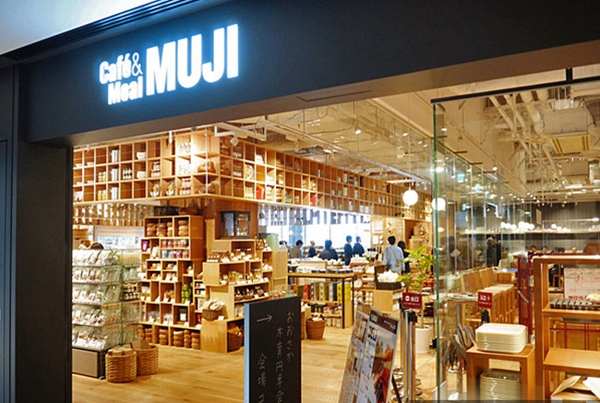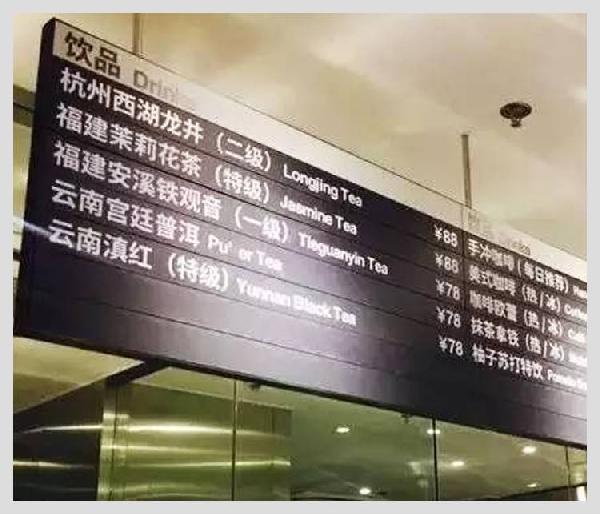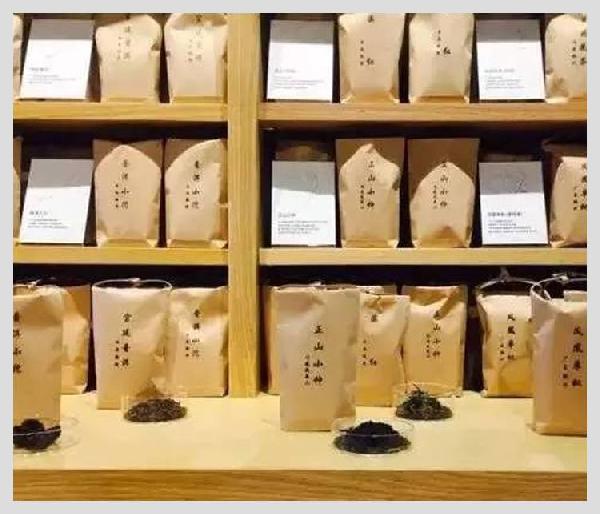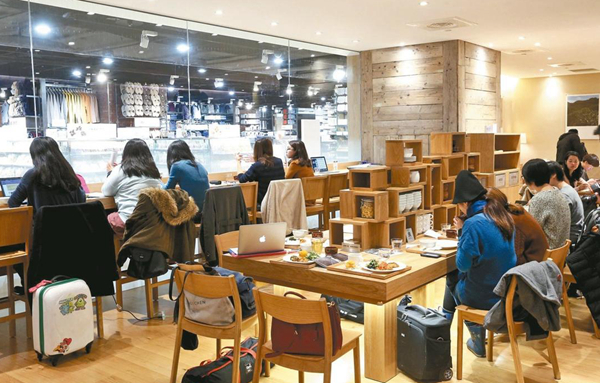MUJI runs a coffee shop. Can it open a coffee shop well?
Follow the caf é (Wechat official account vdailycom) and found that Beautiful Cafe opened a small shop of its own.
MUJI recently opened cafe MUJI, the first cafe in China, in Shanghai's Dayue City.
MUJI who "doesn't do his proper job"
Although it is called Caf é, according to the order of the menu, Chinese tea is ranked before coffee-there are Xihu Longjing Tea, Anxi Tieguanyin Tea, Phoenix Dancong and so on. The first of the four types of coffee is made by hand. The shop covers an area of less than 200 square meters and has 52 seats. Previously, caf é MUJI had eight stores in Japan, while the Shanghai Dayue City store was the first time MUJI opened a coffee shop outside Japan.
In fact, since 2015, MUJI has stepped up efforts to expand new business type in China. In addition to the main store that originally existed in the form of a grocery store, MUJI also opened MUJI Bakery, which mainly deals in baking, MUJI BOOKS, which does bookstore business, and Caf é & Meal MUJI, which focuses on catering. Most of these stores are located in Shanghai, Hong Kong and Chengdu, the new battleground of MUJI. The world's first Hotel Theme MUJI Hotel, which will open in 2017, will be located in Beijing rather than Japan.
Before experiencing the only MUJI Hotel in the world, you can have a cup of Chinese tea at the first cafe MUJI in China. It differs from Caf é & Meal MUJI, which operates two stores in China, in that it specializes in tea, coffee and desserts, while the latter focuses on Japanese light meals.

MUJI loyal fans? No kidding.
"the coffee shop? You mean Caf é & Meal? When I opened my business last year, I ate it. There were a lot of people, and the food tasted mediocre. I haven't been there since. " Although not loyal, the 25-year-old Xiao Shi should be a microcosm of MUJI's typical users: young, returnee, quality of life and a well-paid job in Shanghai.
Speaking of MUJI's new coffee shop, Xiao Shi said he had not heard of it and did not intend to go there on purpose. Whether you admit it or not, young consumers in first-tier cities are less and less feverish enough to blindly pay for a particular brand.
The MUJI brand itself is not "born for fever": "Muji" in the name "MUJI" means "no brand (premium)", so it can control prices while maintaining high quality. For Japanese consumers, MUJI itself is just a store for ordinary household goods, which is inexpensive and nothing special. MUJI was labeled as "Japanese aesthetics" in the early days of entering the Chinese market, and has been popular with the wave of "consumption upgrading" in recent years. But as the freshness fades and the dense number of stores has grown to about 200, the sense of "niche boutique" has been diluted, and MUJI has been lowering the prices of products in China to move closer to consumer goods.
The fatigue of growth under the appearance of store expansion
The decline in user awareness in China is a red flag for brands. In order to continue to attract users, MUJI needs to make more attempts on the original foundation. What's more, MUJI plans to add another 43 stores in Chinese mainland by February next year, accounting for nearly 70 per cent of the total number of planned stores in the world.
MUJI has made a big bet on revenue growth in China, which is probably a relatively safe way to expand. From March to August 2016, MUJI earned 26.4 billion yen in China, second only to Japan, according to data disclosed in MUJI's three quarterly reports. On the other hand, consumers in Europe and the United States obviously have a low acceptance of Japanese-style freshness. The overall revenue in Europe and the United States is only 1/3 of that in China, and there has been a decline in revenue in Britain, France and other countries. At the same time, MUJI's crisis is emerging: despite growing stores and rising overall revenue in the second and third quarters of 2016, MUJI's revenue growth narrowed by nearly 10 per cent year-on-year, meaning that existing business growth space is declining sharply. In China, where this phenomenon is most obvious, MUJI's revenue growth fell by nearly 70 per cent.
For MUJI, in addition to expanding stores and improving business efficiency, finding new growth points in the main market is perhaps the most important thing in the next few years.
MUJI also wants to change.
MUJI needs to find a new engine of growth in China. Food and beverage seems to be a good choice. after all, Ikea has been doing a good job in this respect. In fiscal year 2015, Ikea sold 6 million classic Swedish meatballs and 12 million ice creams, and the restaurant business contributed about 10 per cent of Ikea's total revenue in China.
However, MUJI needs to note that its logic may be different from that of Ikea. Ikea catering is run with several floors of home shopping malls, and Ikea rarely opens its stores in the city center. Consumers who choose Ikea have a more specific purpose, often spending hours or more in the store.
Founder Ingvar originally set up the restaurant business, hoping to give customers a break and start the next round of shopping. For customers, in addition to Ikea restaurant, there seems to be no other choice, not to mention the taste of this option is passable.
But MUJI's stores are all in the front-line business district, and it seems that Caf é is a relatively independent store. This means that it will face direct competition from coffee and tea drinks.
Without "& Meal", Caf é MUJI is more like plunging into the Red Sea: "each other's Tea" is one of nearly 20 similar beverage shops in Shanghai's Dayue city, where the first store is located. Unlike Caf é MUJI, which specializes in brewing raw tea, each other's teas tend to be "mixed"-litchi black tea, peach oolong and so on, all of which are used to attract young consumers. Founder Zhang Zihua is not worried that MUJI will separate its own consumers, but believes that the addition of MUJI will make more young people who do not drink tea start to pay attention to this category and bring more passenger traffic to "each other's tea".
Miao Qin, founder of flavored tea reported by 36 krypton, also holds the same view: Starbucks, MUJI and other big brands have launched tea products one after another, which is more helpful for Chinese young people to build cultural self-confidence and try more tea.
However, except for competition from neighboring stores, coffee é MUJI teas are all sold in pots, which to some extent restricts their own drinking scene.

The new store offers only four light meals, focusing on a selection of coffee beans and tea. Obviously, the drink is the main character.
▲ tea is at the left end that is most easily noticed.
Judging from the order of the menu, tea seems to be more valued than coffee.
On the blackboard menu, tea is on the far left of consumers' priority, and paper bags containing tea have become part of the design and decoration on the store display.

A wall decorated by ▲ with paper bags of tea
It is worth noting that there is no recent strong trend of preparing tea in Cafe MUJI, but it simply chooses traditional categories such as Longjing, jasmine tea, Tieguanyin and Pu'er to brew tea and sell it by pot.
The teas sold include: Longjing, Tieguanyin, Fenghuang Dancong, Pu'er, Dianhong and so on.
Coffee products also do not see mocha, lattes and other "familiar faces", hand-made as the main hit, coffee beans from Lincang in Yunnan, Mantenin in Indonesia, Yega Snow in Ethiopia, and so on.
▲ jasmine tea
Compared with other stores, the Caf é MUJI, with a small area and more than 50 seats, is designed on the basis of a "serious face" with a brighter and more vibrant overall tone.
Now make tea + hand coffee, the ingenuity of the product
MUJI, which focuses on home furnishings, clothing and other products, does not open very fast, but its ambition is not small.
At the end of 2015, restaurants were opened at two flagship stores in Chengdu Ocean Taikuri and Shanghai Huaihai 755 (the latter has also been implanted with MUJI books); in September, a bakery was introduced at Dragon Dream in Shanghai Zhongshan Park; and the latest news is MUJI Hotel, which will open in Beijing and Shenzhen.

▲ MUJI Cross-border Bookstore, Catering, Bakery, Hotel.
The new cafe, which is relatively unsurprising, is MUJI's closer proximity to consumers' lifestyles.
Cleverly, Caf é MUJI tries to capture the maximum common divisor with a differentiation--
The choice of traditional tea and hand brewed coffee.
On the one hand, for consumers who are familiar with or recognize the MUJI brand, Cafe MUJI is a preferred place to "clock in" for parties.
On the other hand, it catches the attention of people who like tea and coffee, in order to provide new consumption increment.
There are many shops selling tea and coffee, but it is rare to drink a cup of traditional tea or hand-brewed coffee in a genuine "frigid" place.
In such a scenario, Caf é MUJI is not only a part of consumption, but also a function of conveying brand ideas and draining to other sections.
More importantly, whether in traditional teahouses or boutique cafes, the price of 78 yuan per pot and 38 yuan per cup is really not a luxury.
However, whether such an attempt can be recognized still needs to be tested by the market.
How to develop a super brand with "no brand"?
This brand, which has always been regarded as "aloof", is imperceptibly close to people's lives in various ways.
In the business trend that emphasizes focusing and segmenting the market, MUJI seems to be the opposite, spreading and constantly widening its boundaries, making it a distinctive classic sample. The key lies in two aspects that complement each other:
➤ Brand concept output
If you have a little understanding of MUJI products, the key words that come to mind first will be "practical, simple, environmentally friendly and simple".
It looks a little boring, but it's almost an aesthetic that won't be out of date.
And this aesthetic has become a unique concept, reflected in almost every item sold in the store--
From simple storage boxes to recycled paper notebooks, from lifestyle-related MUJI BOOKS displays to Caf é & Meal cereal rice, each item is the creator of the atmosphere, conveying "natural" and "minimalism".
The priority of values is a cognitive basis to expand its own business boundaries. once it is recognized by most consumers, it can establish a profound emotional connection, so as to achieve the vitality of the brand's dream.
Despite the fierce competition, MUJI still chose to join the tea market because it is likely to be one of the best options in the format model: China's tea consumption stock market exceeds 300 billion yuan, while there are no absolutely dominant brands in tea products for young people; moreover, beverage products are easy to standardize and their gross profit margin is much higher than that of catering.
How to make differentiation to deal with the competition is still an important proposition for MUJI under new business type to solve.
Important Notice :
前街咖啡 FrontStreet Coffee has moved to new addredd:
FrontStreet Coffee Address: 315,Donghua East Road,GuangZhou
Tel:020 38364473
- Prev

The way of operation of the coffee shop, the business scope of the coffee shop
First, develop peripheral snacks to increase total consumption. Nowadays, coffee shops operate a wide range of products, including all kinds of hot and cold drinks, Chinese and western dim sum, coffee noodles, coffee products and so on. It is not easy to pay for a restaurant by selling coffee alone. The combination of dim sum and simple meals should be strengthened to increase customer consumption. 2. Coffee operators should pay attention to keeping coffee fresh
- Next

High recognition is the survival rule of boutique cafes. Have you learned it?
In the industry, Wei Hannight agrees that boutique coffee is now a wave, the number of people willing to consume and try boutique coffee is increasing, and the chances of survival of boutique cafes are also increasing. The picture shows Wei Hanyi, founder of BerryBeans, who has been in business for nearly two years. BerryBeans has been creating a high degree of recognition of boutique coffee, which is the way for the cafe to survive. Boutique coffee
Related
- What documents do you need to go through to open a coffee shop? coffee shop coffee shop certificate processing process
- How to purchase Coffee beans in small Cafe how to choose a suitable supplier for domestic Coffee supply Company
- How to drink Starbucks Fragrance White Coffee? how to make Australian White Coffee? what Italian coffee beans are recommended?
- The Story of Flora Coffee: the name of Flora Coffee Bean and the implication of the Flowers on Florna Coffee
- How much does a cup of coffee cost? How much is the profit of a cup of coffee? What is the profit of the coffee shop in a year?
- Yunnan small Coffee, known as "fragrant Coffee", introduces the characteristics of Alpine Arabica Coffee producing areas in Yunnan, China
- 2023 latest Starbucks full menu price list how much is a cup of Starbucks coffee what is better to drink the most popular hot and cold drinks recommended
- Starbucks different kinds of Coffee Price list Starbucks menu 2023 Top Ten Best drinks in Starbucks
- Starbucks Spring praise Comprehensive matching Coffee Bean theme Story Packaging implication and taste description
- The cost of a cup of coffee latte American coffee cost price and selling price

